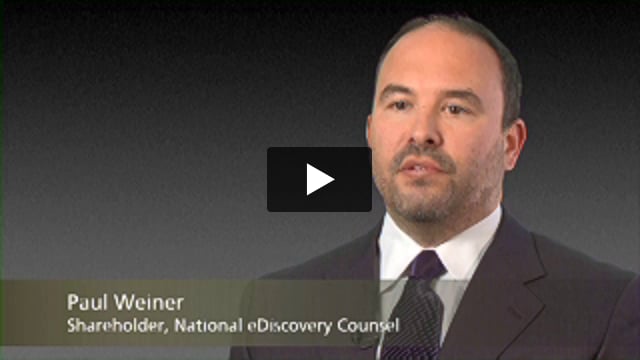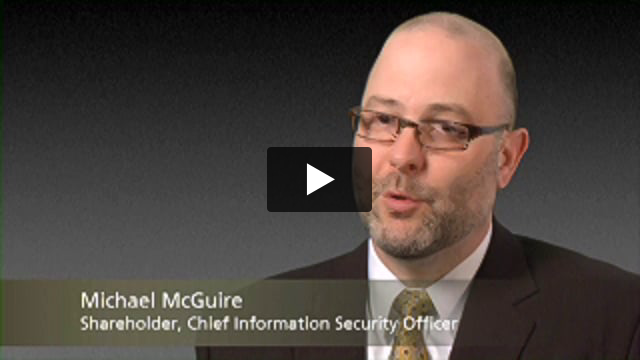Complete the form to see how our attorneys may be able to assist you
With continued advancements in technology and the ongoing digitization of the global workforce for businesses and individuals alike, electronic records are more than ever at the center of employment litigation. Coupled with the staggering volumes of data that are created every day and the Judiciary’s lower tolerance for eDiscovery ignorance or misconduct, it is no surprise that employers continue to struggle with the time consuming, disruptive to day-to-day business, and expensive challenges of meeting eDiscovery obligations. Simply stated, eDiscovery is one of the most significant developments in the legal world in recent years, literally transforming every aspect of evidence in litigation and information management in the workplace.
Very early, Littler recognized this trend and its importance to employers operating in a global workplace who were faced with an explosion of electronic data and emergent technologies, along with new rules and legal standards developing at a breakneck pace. Littler pioneered the practice of hiring attorneys at the shareholder level to focus exclusively on eDiscovery and has at the ready a team of attorneys dedicated full-time to managing eDiscovery worldwide.
Single Focus
Littler’s eDiscovery team is led by Paul Weiner, one of the nation’s premier thought leaders in eDiscovery. In addition to his practical, hands-on experience that comes from litigating scores of cases across the U.S., Paul serves as the Permanent Co-Chair of the Advisory Board for the Georgetown Law Advanced eDiscovery Institute® and on the Steering Committee of the Sedona Conference® Working Group on Electronic Document Retention and Production (WG1), and has also served as a court-appointed eDiscovery Special Master in federal and state courts.
Paul has assembled a group of lawyers with impressive credentials and extensive knowledge of leading-edge eDiscovery issues, including:
- A multilingual eDiscovery litigator with over fifteen years of experience in cross-border eDiscovery issues and who is a Certified Information Privacy Professional/Europe (CIPPE/E) of the International Association of Privacy Professionals
- An active member of the Sedona Conference’s Working Group on International Electronic Information Management and Disclosure (WG6), who Co-Chaired The 6th Annual Sedona Conference® International Programme on Cross‐Border Discovery and Data Protection Laws in London, England
- A litigator who spent several years coding, designing, and leading the development of supply chain software applications for a Fortune 100 technology company before attending law school
Littler’s eDiscovery lawyers focus only on eDiscovery, allowing them to remain current on the latest legal and technology developments and to proactively advise clients before disputes with opposing counsel arise. Each of our eDiscovery shareholders also has real-life trial experience, so they bring a practical and cost-effective perspective to what can otherwise appear to be esoteric eDiscovery issues that can hijack a case. They also never lose sight of the fact that the goal of all discovery – including eDiscovery – is to win the case, so every activity needs to further that objective.
State-of-the-Art Technologies
In addition to its eDiscovery lawyers, Littler also employs a nationwide team of Litigation Support Specialists who leverage technology to streamline the collection, management, review, production and presentation of evidence, in a cost-effective yet powerful manner, using state-of-the-art eDiscovery technologies that have been rolled out firm-wide, including:
- Relativity®, a state-of-the-art evidence review and production application
- Relativity Fact Manager, a strategic analysis tool designed to graphically organize details of a case, such as facts, issues, people and organizations
- Thomson Reuters® Case Notebook (Transcripts), a real-time transcript reporting and enterprise transcript management application
- TimeMap® timeline graphing tool
- Microsoft SharePoint® web-based collaborative workspaces for distributed teams
- TrialDirector® trial presentation software
Littler has also built the Littler National Data Center that can perform an array of tasks associated with eDiscovery, including processing electronic evidence and hosting case databases. With this unique resource, Littler provides clients with a turn-key solution that typically is more cost-effective and streamlined than using outside vendors.
Littler also has significant eDiscovery vendor relationships that our clients can leverage for specialized assistance in various aspects of eDiscovery including: harvesting electronic data; forensic analyses of electronic media; and managed “document review” (offering an alternative pricing approach to what can sometimes be the most costly aspect of large cases).
In short, Littler offers clients a full range of eDiscovery services to meet the needs of any case, from small, single-plaintiff administrative charges or internal investigations where only a handful of key custodians’ emails are at issue, to trade secret matters where disputes over unique data sources are the central focus of the case, to bet-the-company, nationwide class or collective actions where hundreds of gigabytes and multiple types of electronic data are in play.
eDiscovery Contacts

Best Stand-Alone eDiscovery Practice in the Nation



